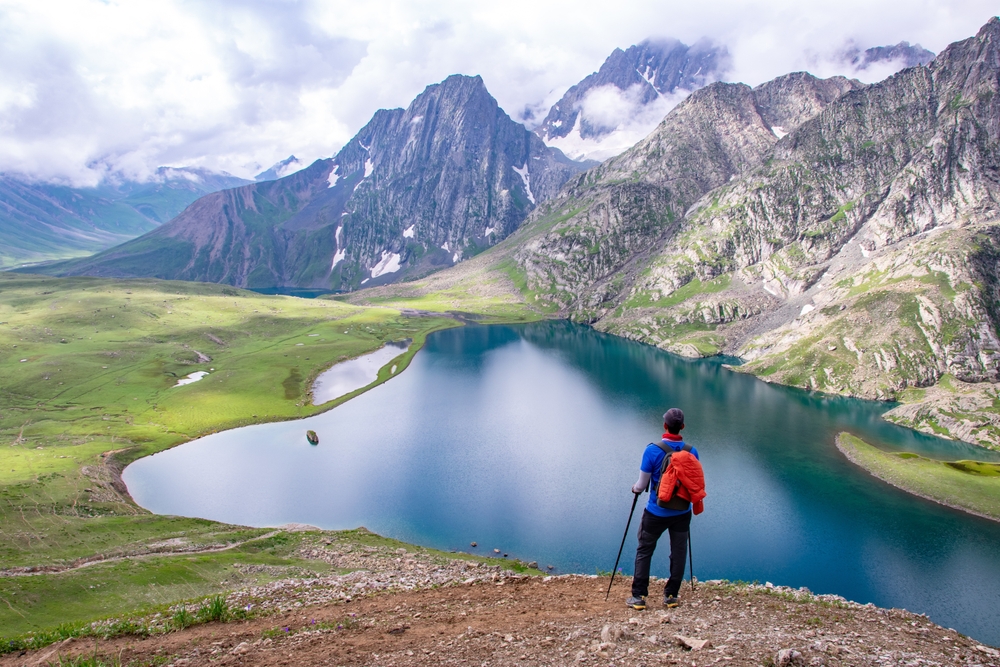Trekking through the enchanting landscapes of Kashmir, especially the Kashmir Great Lakes trek, is an adventure that leaves an indelible mark on your soul. However, if you’re considering this once-in-a-lifetime journey, you might wonder: Why choose a guided trek instead of venturing on your own? Well, let me share my personal insights. Here are 10 compelling reasons to opt for a guided Kashmir Great Lakes trek that will convince you to leave the map and compass behind and let an experienced guide take the lead.
1. Expert Knowledge and Local Insights
One of the most significant advantages of opting for a guided trek is the expert knowledge you’ll gain. Having a guide who is not only experienced but also intimately familiar with the region’s history, culture, and geography enriches your experience. It’s like unlocking a treasure chest of stories and facts about the local flora, fauna, and ancient traditions that you wouldn’t find in a typical travel guide. Imagine walking by a serene lake, and your guide shares the folklore behind it—what a difference that makes!
Beyond the stories, a guide’s knowledge of the terrain can help you fully appreciate the landscape around you. Kashmir’s landscapes are breathtaking, with alpine lakes nestled in the mountains, blooming meadows, and pristine rivers. A knowledgeable guide can explain how these features were formed, how the ecosystem operates, and even what’s beyond the mountains in the surrounding areas. Understanding the natural world around you creates a deeper connection to the environment and enhances the journey.
2. Safety First, Always
Let’s face it—trekking in high-altitude, remote regions like Kashmir can be risky. The terrain is challenging, weather conditions can change suddenly, and accidents can happen. You’re in good hands when you go on a guided trek. Guides are trained to handle emergencies, and they know the best practices for altitude acclimatization, ensuring you enjoy the trek without worrying about the unexpected.
Guides are also well-equipped to deal with specific challenges you may face, such as altitude sickness. In high-altitude trekking, it’s important to acclimatize properly to avoid health risks. Your guide will ensure you follow the correct pace, rest when needed, and adjust your itinerary to avoid altitude-related complications. This personalized attention to safety can make all the difference in having a smooth, enjoyable trek.
3. Stress-Free Logistics and Planning
Planning a trek in a place as wild and rugged as Kashmir can be overwhelming. From permits to transportation, accommodation, and route planning—there’s a lot to consider. A guided trek takes all that stress off your shoulders. All the logistics are prearranged, and you simply show up, ready to hike. Trust me, it’s a relief knowing everything is taken care of, allowing you to focus purely on the adventure.
When trekking in a remote region like Kashmir, you might also have to deal with local transportation and permits, which can be tricky to navigate as a solo traveler. A guided trek removes these hurdles for you, with everything pre-arranged, from the entry permits to the transportation to the trailhead. This attention to detail allows you to fully immerse yourself in the trek without worrying about the practicalities.
4. The Convenience of All-Inclusive Packages
Guided treks often come with all-inclusive packages, which means your meals, accommodations, and trekking gear are taken care of. You won’t have to be concerned about your food or sleeping arrangements. After a long day of hiking, the last thing you want is to scramble to find a place to stay or worry about cooking your next meal. With a guide, all that is taken care of, and you can relax and enjoy the experience to the fullest.
The beauty of an all-inclusive trek is the convenience it brings. You won’t waste precious time trying to find food or deal with the hassle of setting up camp after a long day of hiking. Everything is prepared for you, including meals that cater to your nutritional needs during the trek. The accommodation, whether it’s camping or staying in simple guesthouses, is arranged, so all you have to do is show up and unwind. This simplicity makes the trek far more enjoyable and stress-free.
5. Enhanced Trekking Experience with a Group
If you’re a solo traveler or a small group, joining a guided trek offers the chance to meet like-minded people who share your passion for adventure. Trekking in a group is a fantastic way to make new friends and share stories, making the journey even more memorable. Plus, the camaraderie you build along the way makes the tough stretches of the trail feel much easier. If you’re planning to tackle the Kashmir Great Lakes trek, I suggest checking out The Searching Souls. Their experienced guides and personalized services will enhance your adventure every step of the way.
A sense of collective accomplishment is another benefit of trekking in a group. Every step you take and every lake you reach is a shared victory. The laughter, encouragement, and collective energy create a bond among trekkers that can’t be matched. Plus, you’ll have the added benefit of learning from others’ experiences and sharing tips along the way, enhancing your overall experience of the trek.
6. Access to Hidden Gems and Off-the-Beaten-Path Spots
There’s so much more to Kashmir than the popular tourist spots. A guided trek ensures that you explore places that aren’t on the usual tourist map. Think about discovering hidden lakes, secluded meadows, and picturesque viewpoints—places only locals and seasoned trekkers know about. With a guide, you’ll venture into these unexplored corners and experience Kashmir in all its untouched beauty.
These hidden gems often provide the most authentic and serene experiences. Imagine trekking to a secluded lake, with no one else around, the only sounds being the wind and the occasional bird. These moments are the essence of why people trek in the first place—to find peace and beauty away from the crowds. A guide ensures you’re not just following the main trail, but exploring these quiet, magical spots that make the Kashmir Great Lakes trek so unique.
7. Avoid Getting Lost or Off Track
The Kashmir Great Lakes trek is not a simple stroll through the park. The trail can be tricky to navigate, especially with the lack of clear signage and sometimes-changing weather conditions. A guide will keep you on the right path and prevent you from getting lost or wandering off track. It’s one less thing to worry about while you take in the breathtaking scenery.
Getting lost in such a vast and remote landscape can lead to dangerous situations, especially in the absence of proper trail markers. By opting for a guided trek, you’ll always have someone who knows the way, ensuring you stay on course and avoid unnecessary detours. Your guide also understands how to handle tricky terrain, helping you cross streams, ascend steep slopes, and deal with other obstacles smoothly.
8. Physical and Mental Support Throughout the Trek
Trekking at high altitudes is as much a mental challenge as it is a physical one. There will be moments when your body feels exhausted or your mind doubts your ability to go on. A guide provides the necessary motivation and encouragement to keep you going. They understand the struggles you might face and know exactly how to push you in a supportive way.
Mental fortitude is key when trekking in a challenging environment, and guides are experts in keeping spirits high. Whether it’s offering words of encouragement during tough climbs or helping you navigate your fears, a guide can provide the mental support needed to keep going. This emotional support makes the experience far more enjoyable, as you feel cared for and motivated every step of the way.
9. Eco-Conscious and Responsible Trekking
Guided treks often prioritize eco-friendly practices and responsible tourism. Guides are trained to minimize the environmental impact of trekking, ensuring that the beauty of Kashmir remains untouched for future generations. By choosing a guided trek, you’re also contributing to the local economy, supporting the communities and preserving the environment of this majestic region.
The focus on sustainable practices is vital, especially in places like Kashmir, where the ecosystem is delicate. Guides are trained to minimize waste, preserve water sources, and maintain clean campsites. Additionally, many guided treks work with local communities, ensuring that the benefits of tourism are shared fairly. As a responsible traveler, you’ll feel good knowing that your trek is contributing to both the preservation of the environment and the well-being of local people.
10. A Sense of Achievement with a Guided Experience
Finally, when you complete the Kashmir Great Lakes trek with a guide, you’ll have a sense of accomplishment that feels even more rewarding. Knowing that you’ve completed this challenging journey under expert guidance, with all the highs and lows along the way, makes the experience incredibly fulfilling. The sense of community and support throughout the trek enhances the triumph of reaching those magical lakes.
The journey itself becomes an unforgettable story—one of personal growth, community, and triumph. Reaching the Kashmir Great Lakes with the help of an experienced guide means you’ve conquered not just the physical challenges but the mental ones too. It’s an achievement that will stay with you long after you’ve left the trails.
Conclusion: Why Wait? The Great Lakes Trek in Kashmir Is Waiting for You
If you’re still debating whether to go for a guided trek or venture solo, I hope these 10 reasons have helped you see the value in choosing a guided experience. Not only will you enjoy the majestic landscapes and hidden treasures of Kashmir, but you’ll also be in safe hands with a knowledgeable guide, ensuring that your adventure is seamless, enriching, and unforgettable. The Kashmir Great Lakes trek is calling, and I promise you, it’s an experience you won’t regret.
Also Read
- ► The Latest Trends in 2025 for Cash for Silver: What You Need to Know
- ► Struggling with Management Assignments? Let Experts Handle It for You
- ► How Adwysd And Corteiz Clothing Sets You Apart
- ► Stand Out with Sp5der and Hellstar Hoodie Designs
- ► Fast-Tracking Your Insurance Company Registration: Expert Tips
- ► How to Choose the Right Signboard Manufacturers for Your Business
- ► What is the fee structure for MBBS abroad?
- ► Top 10 Interior Design Courses to Pursue After Graduation
- ► How to Solve PTE Reading and Writing Fill in the Blanks?
- ► Yezzy Slides and Comme des Garcons The Ultimate Blend of Style and Comfort
- ► Why Is Choosing a Trusted Car Repair Service Essential for Your Safety?
- ► Ontario’s Finest Flooring: Shop Ora Flooring & Stairs
- ► Best Student Cities for Studying Overseas: Ahmedabad Agents
- ► Waarom Bijles Den Haag van Premium Bijles & Coaching het verschil maakt voor leerlingen
- ► Your Soulmate Awaits: Top Marriage Bureaus in Delhi Revealed





